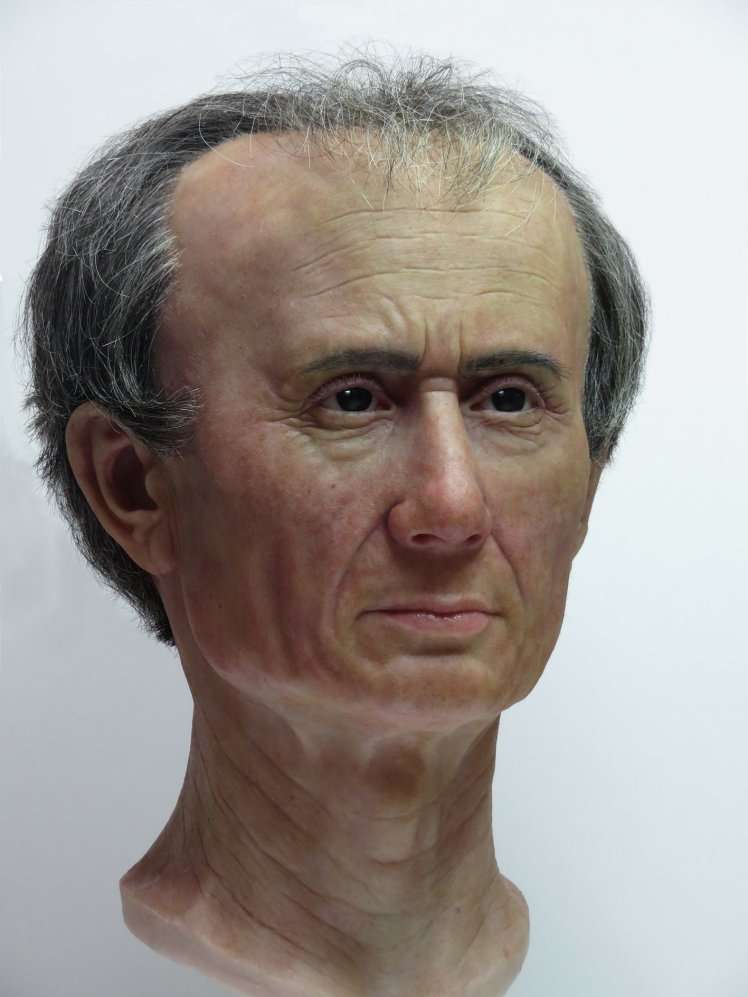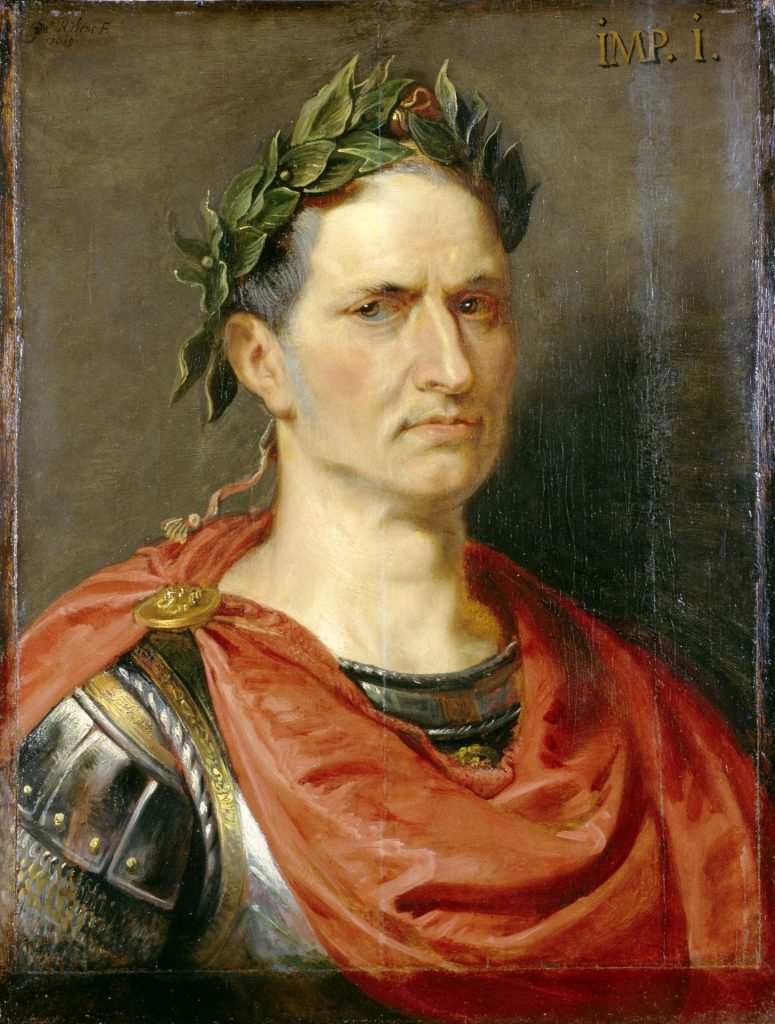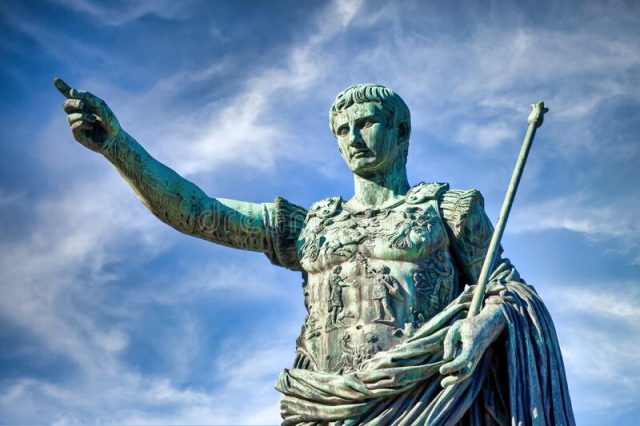Gaius Julius Caesar was born in 100 BC in Rome, Italy. Caesar’s father, Gaius Julius Caesar, who was a Praetor and ruled the province of Asia, also bears the same name as his son. His mother, Aurelia Cotta, also came from a noble family. Caesar was also the nephew of the famous Roman general Gaius Marius. Caesar’s family was noble. And in the Roman Senate, where traditional cunning, conspiracy and power struggle prevailed, he supported the Populares ideology, which was more advocating for the democratization of government and the rights of the lower classes, not the Optimates group, which advocated the supremacy of Roman values.
There are few records of Caesar’s childhood. It is known that he has two sisters and both of them are named Julia. In the biographies written by Suetonius and Plutarch, Caesar’s life story begins in his youth, and the opening paragraphs of both works are missing. During Caesar’s childhood, the Social War (91-88 BC) broke out between other Italian cities that were allies of Rome and the Pontus ruler VI. Mithridates’ threat to the eastern provinces of Rome caused chaos in political life.
The Optimates, from the groups in the Roman Senate, advocated the rule of the aristocrats, while the Populares preferred elections. In Rome, Caesar’s uncle Marius, supported by the Populares group, and Lucius Cornelius Sulla, supported by the Optimates, rose to prominence during the Social War. When the two rivals clashed over the issue of commanding the campaign against Mithridates, Marius ultimately won, but died in 86 BC. The following year, when Caesar’s father died while he was putting on his shoes one morning, Caesar, who was only 16 years old, took over his family right in the middle of the civil war between his uncle Marius and Lucius Cornelius Sulla.
Hoping that his becoming a priest would benefit his family, the young Caesar ran for the priesthood and was ordained as the new Flamen Dialis, replacing the Jupiter high priest Merula. The rule was that the priests of Jupiter, as well as the people they would marry, had to be patricians. Therefore, Caesar broke up with the girl named Cossutia, whom he had been engaged to when he was a child, and married Cornelia, the daughter of Lucius Cinna. When Sulla, who had won the civil war in 82 BC, declared himself dictator, he began to systematically purge his enemies and adherents of the Populares ideology. Caesar, who was targeted because he was Marius’ nephew and Cinna’s son-in-law, had to flee Rome. With his uncle’s inheritance and his wife’s dowry confiscated, and deprived of the priesthood, Caesar was ordered to divorce Cornelia as well. When he refused to kneel and divorce his wife, he had to hide. However, he was reluctantly pardoned, thanks to the mediation of some of Sulla’s supporters and family members.
Left without any support, Caesar joined the army to pursue a long and glorious career rather than wait for Sulla’s pardon. He served under the propreator Marcus Minucius Thermus in Asia and Servilius Sauricus in Cilicia. Proving himself, Caesar was awarded the Corona Civica crown made of oak leaves, one of the highest military decorations a Roman soldier could use, for his outstanding service at the siege of Lesbos. Devotion to his soldiers, and his understanding of how important his men’s respect and loyalty were, was the foundation of Caesar’s life in the army. During this period, it was rumored that he had an affair with Nicomedes when he stayed longer than necessary in the king’s palace during his duty to accompany the navy of Nicomedes IV, the king of Bithynia. Caesar, on the other hand, vehemently denied this claim.
After Sulla, who was dictator and served as consul until 80 BC, died in 78 BC, he decided to return to Rome, which he saw as safe for himself. However, as all his property was confiscated, he settled in a house outside of Rome in the Suburra neighborhood, where low-class people lived and the city’s brothels were located. Thanks to his extraordinary oratory skills, he started to practice law and soon became famous for his ruthlessness in the cases of former governors accused of corruption. He sided with the angry people against the wealthy elite occupying the Senate and against any inequality.
In 75 BC, he went to Rhodes to Apollonius Molon, who had previously trained Cicero, to excel in the art of oratory. While sailing to Greece, Caesar was kidnapped by Cilician pirates and held for ransom in the small Farmakos, one of the Dodecanese Islands. When the pirates said that they would demand a ransom of 20 talentum for him, Caesar claimed that he was worth at least 20 talentum, according to his high office. When Caesar was taken prisoner, he was treated well and formed a friendly relationship with the pirates. However, after he was released, he said that he would catch the pirates and crucify them because they humiliated his family and himself, and this threat was perceived as a joke by the pirates.
After he was released, Caesar kept his promise and returned with the navy he kept and imprisoned the pirates he had caught in Bergama. When the governor of Bergama preferred to sell the pirates as slaves instead of killing them, he refused. Returning to the shore, he crucified the pirates himself. However, he tolerated them for being good to himself in captivity and ordered that their throats be cut first. As can be understood from this incident, Caesar’s determination to say what he will do and to do what he says when the time comes is one of the features that he never gave up on throughout his life.



After taking his revenge on the pirates, he sailed towards Rhodes. However, after a while, he was recalled to the army against the invasion threat from Pontus. On his return to Rome, he was elected to the tribunus task, which is the first step of the Cursus honorum, which is the public duty order that politicians in public administration have to undertake. In 69 BC, he was chosen as quaestor who was responsible for overseeing the state treasury, criminal and financial affairs. In the same year he lost Marius’ s widow Julia and his wife Cornelia.
It is claimed that when he went to Hispania for the quaestor duty under Antistius Vetus, looking at the statue of Alexander the Great, who conquered most of the world when he was the same age as him, he realized that he had accomplished little and set new goals for himself. When his request to leave his post early was accepted, he married Caesar Sulla’s wealthy grandson, Pompeia, from the Optimates group, who returned to Roman political life. He was elected to the office of Aedilis, responsible for the appropriations for the construction of state buildings and the organization of folk festivals.
During this period, Caesar arranged lavish plays that popularized him, but made him heavily indebted. He filed many lawsuits, had people sentenced, and had an official residence in Via Sacra, the main street of Rome, where the most important religious buildings are located, starting from the Capitol Hill.
During the Bona Dea festival held at Caesar’s house, men were not allowed to participate in the festival. Despite this, Publius Clodius Pulcher, a young patrician, was caught trying to seduce Caesar’s wife, Pompeia, by entering his house dressed as a woman. At the trial of Clodius, who was accused of blasphemy in order not to offend one of Rome’s most powerful patrician families, Caesar said “there should be no doubt about my wife,” but divorced Pompeia soon after the scandal.
Caesar left Rome in 58 BC and went to Gaul. Germanic tribes threatened to invade Gaul. Thereupon, Caesar had a bridge built on the Rhine, marched his legions on the Germanic lands with a show of strength, then returned and had the bridge dismantled. The Germans understood the message and never dared to cross the Rhine again.
Caesar twice defeated the tribes of the north and twice invaded Britain, and this was Rome’s first British attack. At the Battle of Alesia in 52 BC, he defeated the Gallic leader Vercingetorix and completed the conquest of Gaul. Vercingetorix’s attack nearly destroyed Caesar. The Roman general laid siege, but when the Romans came dangerously close to defeat, they were victorious with an extraordinary attack. Caesar now ruled all of Gaul, and he had a great fortune at his disposal.
According to Plutarch; During the Gallic Wars, Caesar fought 3 million people, killed 1 million people, enslaved 1 million people, subjugated a total of 300 tribes, and 800 cities were destroyed in the war. Compared to the Roman generals, Caesar was the one who made the most campaigns and left the most booty to his soldiers. The farther Caesar took his army, the richer he became and the more soldiers he recruited.
Despite all his success, when he returned to Rome, Pompey, who married Cornelia, the daughter of one of his political rivals Quintus Metellus Scipio, now managed to become the only military and political power in Rome. The Senate declared the end of Caesar’s governorship of Gaul and ordered him to return to Rome as an ordinary citizen. This meant that Caesar could be prosecuted for his actions during his consulship. In addition to ordering Caesar to demobilize his army, the Senate forbade a second consul to the Senate.



On January 10, 49 BC, at the head of the famous Legion XIII Gemina, which Caesar refused to demobilize rather than return to Rome as an ordinary citizen as ordered, he crossed the Rubicon River, where the generals were forbidden to cross with their armies. Since the Rubicon was the border between Gaul and the Roman province, Caesar’s crossing this border was considered a declaration of war against Rome. With Caesar’s conquest of Rome, Pompey accused Caesar of treason.
Most of the cities in northern Italy surrendered to Caesar. Despite having many more soldiers than the legion, Pompey preferred to flee rather than fight. When Caesar’s soldiers arrived, Pompey managed to escape at the last moment by anchoring with his troops. Later, Caesar also defeated the rulers of Pompey. After the victory, he marched on Pompey, who was waiting in Greece. Although Pompey tried to starve Caesar’s troops, Caesar decisively defeated Pompey, who had twice as many soldiers as himself, at the battle of Pharsalus.
When the news of Caesar’s victory reached Egypt, the Egyptians; They believed that the gods preferred Caesar over Pompey. And they killed Pompey as soon as he stepped ashore. Caesar, who came to Egypt after Pompey, who was betrayed by the people he sought refuge, was enraged by the murder of Pompey and declared martial law in the country and captured the royal palace. Rumor has it that when he was shown Pompey’s head, he wept with sadness and ordered those who killed his enemy to be executed.
Caesar was involved in the Egyptian Civil War, in favor of Cleopatra, between Ptolemy and his sister, wife, and vice-queen Cleopatra. Caesar managed to defeat the forces of Ptolemy with the Battle of the Nile in 47 BC, and celebrated his victory with a glorious victory procession with Cleopatra. Cleopatra visited Rome several times and stayed at Caesar’s villa during these visits. Although Caesar’s failure to marry during his long relationship with Cleopatra was not considered adultery by the Romans, it was criticized in the Senate. Caesar and Cleopatra had a child known as Ptolemy Caesar or Caesarion, who even came to Rome with his mother. However, Caesar never admitted that the child was his.
In 44 BC, the Roman Senate legitimately granted Caesar the title of Dictator Perpetuus, which would allow him to rule the country for life. Contrary to what is known today, Caesar never took the title of ‘Emperor’ and never defined himself as such.
Caesar initiated various political reforms, such as distributing more land to the poor, that would make him conflict with the senate. It is noteworthy that Caesar, who was declared a lifetime dictator, made social reforms instead of enjoying wealth and power. This situation, which is not encountered in any dictator or tyrant, reflects his extraordinarily idealistic and consistent personality. Caesar prepared reforms that could benefit not only the poor, but also the aristocrats, such as the easier appointment of aristocrats in the judiciary.
According to some ancient sources, on March 15, 44 BC, Caesar was killed in the portico of the Great Basilica of Pompey by some 60 assassinated senators. In the leadership of the assassination were his friend Brutus and his wife’s brother Cassius. It was appropriate for the assassination to take place in the Senate, where only senators could enter, so that under their togas they would hide the daggers that would pierce Caesar. Caesar, 55, was stabbed 23 times and collapsed to death at the base of Pompey’s statue. Here are Caesar’s famous last words to his friend, “You too, Brutus” (“Et tu, Brute?).
Assassinated senators made the mistake of not planning what they would do after Caesar’s death. Losing their heroic and innovative leader, the lower and middle class people, in great sorrow, attacked the homes of Caesar’s murderers Brutus and Cassius.
